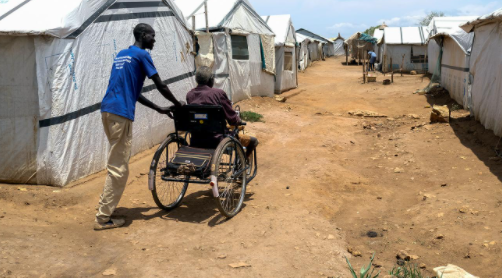Persons with disabilities (PWDs) in Western Bahr el Ghazal State have called on the parties to the revitalized people agreement to appoint a member of parliament to represent them in the state assembly.
Speaking on Monday ahead of the international day of people with disabilities on 3 December, the PWDs in Wau said they must get a seat in the state assembly.
Stephen Baptist Balac, the state secretary for persons with disabilities in Western Bahr el Ghazal State, said they do not have representatives both in the national and state assemblies.
“Up to now, we the disabled people do not have our representative at the national level as well as state assemblies,” Balac said. “That is why we are calling on the government to let us share at all levels of the assemblies.”
He said the constitution of PWDs has not been incorporated into the national constitution and that the national assembly should enact a law to protect their rights.
“We also need our representatives at the state ministries and also government should consider that the disabled have rights in the country to share in government and NGO jobs,” Balac said.
Another PWD, Peter Pual Babur, said they are despised by society but that they have members who are well educated and can carry on any task.
“We do not have our representative in the state assembly but we have disabled people who are well educated,” Banur said. “Let the government think about this and bring us a person to represent us.”
Responding to the matter, the officer in charge of disability affairs at the state ministry of gender and social welfare in Western Bahr el Ghazal State, Lino Ungango Albino, said they are working hard to address the concerns of PWDs and educate the community that they are important.
“We at the ministry of social Welfare are doing our level best to ensure that all the communities in South Sudan understand that people with disabilities staying with the community are useful,” Unggango said. “The community in South Sudan see that the disabled people do not have the ability, they do not have anything in their heads, but today we are lobbying the organizations to help in telling the communities that PWDs have much work and equal opportunities.”
Meanwhile, Modi Enosabarsa, the executive director for the Young Women Christian Association (YMCA), a local organization working to improve the welfare of PWDs in South Sudan, said her organization is working to have their rights recognized.
“We observe the right of the persons with disability and then we have specific programs for them,” Modi said. “We always say, ‘disability is not inability’ and these people have talent, they can be promoted and are equal to all human beings. Most people neglect their rights, including their right to education and right to employment.”
She added her organization is training the PWDs in advocacy so that they can voice their rights and demands.




